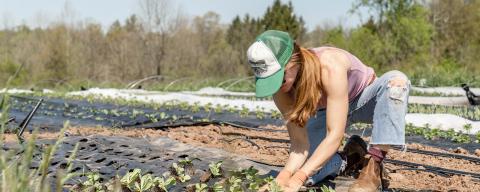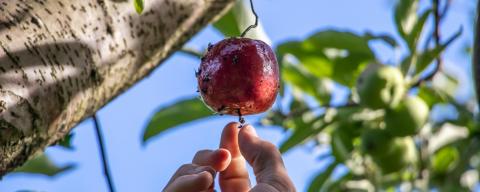Wellness Tips for Women in Agriculture
Make Sure Your Tasks, Tools and Environment Are Ergonomically Appropriate
Farming requires intensive physical work and lots of repetitive motions. Whether splitting wood, pruning trees or digging holes, farm chores can be tiresome. Ergonomics takes into consideration the body’s physical capabilities and limitations in relation to a person’s work tasks, tools and the job environment. One helpful strategy can be using modified tools to minimize injury. To learn more, read “Simple Solutions: Ergonomics for Farm Workers” published by the U.S. Department of Health and Human Services.
Listen to Your Body
Physical changes in the body should be considered when thinking about when and how you work. This Extension webinar provides recommendations for women interested in farming while pregnant, chronically ill or disabled.
Women in Agriculture Wellness Series: Farming While Pregnant, Disabled, or Chronically Ill
Prioritize Mental Health
Farmers should never feel alone in their challenges. Help is always available. There are many resources available to women farmers through the NH Farm & Ranch Stress Assistance Network (FRSAN) – a collaborative effort to address structural root causes of farmer stress, mental health and suicide in New Hampshire.
Find a Support Network
Because farming might sometimes feel isolating, forging social connections with fellow farmers is important. Here are a few ways to connect with other farmers.
UNH Extension Women in Agriculture
Extension’s Women in Agriculture programs provide research-based information and space for discussion and collaboration among New Hampshire women farmers and women business owners. UNH Extension Agriculture Business Management Field Specialist Kendall Kunelius says, “A comfortable environment is key. We use a learning circle format that is participant-centric, with discussions and knowledge sharing among women. We pass on lessons learned and help each other tackle challenges. It’s a fun and a community-building experience.” Access resources and view upcoming events here.
NH Queer Farmer Network
Anyone who is a farmworker, farm owner, or aspiring farmer/homesteader who is living and/or working in the state of New Hampshire and identifies with the word queer is welcome to join this network. Email nhqueerfarmers@gmail.com to connect. This group meets informally online and at farms to form community, assess needs and share opportunities.
BIPOC Farmer Network
Peer-to-peer support, mental well-being, tax help and financial literacy training are provided through this network for people who identify as BIPOC (Black, Indigenous and people of color). This network is supported by staff of the New American Sustainable Agriculture Project at the Organization for Refugee and Immigrant Success. Contact Anthony Munene to connect at amunene@refugeesuccess.org.
Extension Services & Tools That Help NH Farmers Grow
Newsletters: Choose from our many newsletters for production agriculture
Receive Pest Text Alerts - Text UNHIPM to (866) 645-7010


